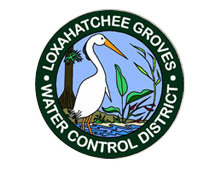The Loxahatchee Groves Water Control District Board of Supervisors, in a special meeting on Monday, opted for a 2017-18 budget plan that assumes a uniform assessment rate for all landowners as the district completes the process of turning over remaining district roads to the Town of Loxahatchee Groves.
LGWCD Administrator Steve Yohe presented options with three different assumptions for a budget that will be just over $1.4 million.
Option 1 assumes that the district is successful in conveying all the district roads to the town prior to the end of the 2016-17 fiscal year on Sept. 30, and does not increase or decrease the assessment rates, but maintains a higher assessment rate for residents who agreed to pay for a bond to have their roads paved.
Option 2 also assumes that the district is successful in transferring the roads to the town and applies a uniform maintenance assessment rate for all district property owners.
“This was done with the same basis of assumptions as Option 1,” Yohe said, explaining that both of those assumptions are that the district no longer maintains the roads, that there is a significant reduction in fuel consumption, new graders and water trucks are not purchased, and the existing graders and water trucks are sold.
Options 1 and 2 include a $30,000 allowance for cleaning culverts, restoring the North D Canal to its design cross section and removing the earthen berm covering North A Road and North Road that was put over the road during emergency repairs in 2012 after Tropical Storm Isaac.
Both options also include funding for a forensic audit called for by the board, and keeping four field employees.
Option 3 makes the assumption that the district is not successful in conveying district roads to the town before the end of the current fiscal year, and increases the maintenance assessment rate $10 per acre for all district landowners, meaning those who pay $150 per acre in the current fiscal year would pay $160 per acre in fiscal year 2017-18, and those paying about $100 per acre would pay about $110 per acre.
“The assumption for this particular option is different,” Yohe said. “Obviously, we would continue to grade and water roads, there is a minor reduction in fuel consumption, mainly because gas prices were down this year from what was budgeted in the previous year. However, I don’t know if that assumption holds up after what transpired this week in Texas.”
The assumption also includes selling the graders and water truck.
“We are paying so much for maintenance, it’s cheaper to rent or lease them, or purchase them even for a year than continuing to maintain these pieces of equipment,” he said.
The board approved the transfer of the remaining district roads to the town, which will be discussed at the Sept. 7 meeting of the Loxahatchee Groves Town Council.
“The result of the town council approving or not approving the quit claim deed and town resolution to accept [the roads] will be crucial for the district’s Sept. 11 board meeting decision for reporting the district’s board-certified approval of the final 2017-18 non ad valorem assessment roll to Palm Beach County on Sept. 12,” Yohe said, adding that options 1 and 2 are break-even budgets.
“There is no money to go into designated reserves,” he said, recommending a uniform assessment rate for all property owners with a small increase.
“The balanced budget is $135 per acre,” he said. “I would encourage you to make it $140 to $145 per acre as a minimum, so as to replenish the designated reserves.”
He said an assessment rate of $145 per acre would reduce about 5,200 acres of property by $5 and increase 2,750 acres by about $45.
Supervisor Laura Danowski asked for details on the designated reserve, and Yohe said the district’s reserve has been as low as $50,000 and is currently about $157,000. He explained that auditors recommend a reserve that is about 25 percent of the annual budget.
“It is essentially your savings account,” Yohe said, adding that $250,000 would be considered appropriate for a $1 million budget.
He also pointed out that equipment purchased several years ago would be paid off after the next fiscal year, which would free up $90,000 annually.
The district will probably go over its 2016-17 budget due to unforeseen circumstances, including the payoff of longtime employees who left, he said.
Yohe clarified that the board was not approving the budget that evening, and said he would welcome any critique. Supervisor Connie Bell, who has experience working with municipal budgets, said she would work with Yohe in the final development of the budget.
Supervisor Simon Fernandez said that since the budget is tight, he would prefer not to allot $30,000 for cleaning district culverts in the coming year.
Yohe said there are some problem culverts, although the condition might not be evident. “Like Texas, you only see the impact during extreme events, and there are some problem culverts out there,” he said. “You could keep it in the budget, and we’ll have additional discussion about it as an alternative at this point in time.”








